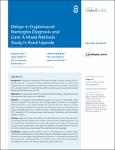| dc.contributor.author | LINK, ABIGAIL | |
| dc.contributor.author | OKWIR, MARK | |
| dc.contributor.author | NABONGO, BETTY | |
| dc.contributor.author | MEYA, DAVID | |
| dc.contributor.author | IRIBARREN, SARAH | |
| dc.contributor.author | BOHJANEN, PAUL | |
| dc.contributor.author | KASPRZYK, DANUTA | |
| dc.date.accessioned | 2023-07-18T09:57:48Z | |
| dc.date.available | 2023-07-18T09:57:48Z | |
| dc.date.issued | 2022 | |
| dc.identifier.citation | Link, A., Okwir, M., Nabongo, B., Meya, D., Iribarren, S., Bohjanen, P., & Kasprzyk, D. (2022). Delays in cryptococcal meningitis diagnosis and care: a mixed methods study in rural Uganda. Annals of global health, 88(1). | en_US |
| dc.identifier.uri | https://doi. org/10.5334/aogh.352 | |
| dc.identifier.uri | http://ir.lirauni.ac.ug/xmlui/handle/123456789/740 | |
| dc.description.abstract | Background: Cryptococcal meningitis (CM) remains a major cause of mortality for HIV infected persons in sub-Saharan Africa, despite widespread access to antiretroviral
therapy. Delays in CM diagnosis and treatment contribute to high mortality, with patients
often arriving “too late” for treatment to be effective. Little is known about patient-related
delays and their experiences with CM.
Objectives: This study seeks to identify the factors related to delays in diagnosis and care
among patients with cryptococcal meningitis.
Methods: A convergent mixed-methods approach was used to understand delays
related to diagnosis and treatment of CM among patients admitted to Lira Regional
Referral Hospital in rural northern Uganda. We collected data from February to March
2020 using surveys followed by semi-structured interviews from 20 CM patients who
survived hospitalization and 20 family members of deceased patients during February
2017–November 2019. Interviews were audio-recorded, transcribed, and thematically
coded for analysis.
Findings: Delays to CM care were related to 1) self-medication, 2) lack of CM education,
3) seeking treatment multiple times at health centers with 4) missed/misdiagnosis, and
5) cultural factors. Among patients who died, 70% sought care ≥3 times, while those who
survived, 35% of sought care ≥3 times before CM diagnosis. Only 10% of patients and 40%
of family members knew what caused CM, indicating a lack of knowledge.
Conclusions: Patients sought medical care for CM symptoms, but several factors
contributed to CM diagnosis and care delays. Many of these factors relate to a lack of CM
education and knowledge among patients and providers. A CM awareness campaign for
the general public, targeted education for HIV patients, and continuing medical education
for healthcare providers can decrease delays and improve outcomes. | en_US |
| dc.language.iso | en | en_US |
| dc.publisher | Annals of global health, | en_US |
| dc.subject | Delays in Cryptococcal | en_US |
| dc.subject | Meningitis | en_US |
| dc.subject | Diagnosis and Care | en_US |
| dc.title | Delays in Cryptococcal Meningitis Diagnosis and Care: A Mixed Methods Study in Rural Uganda | en_US |
| dc.type | Article | en_US |

